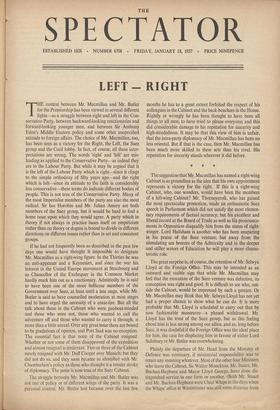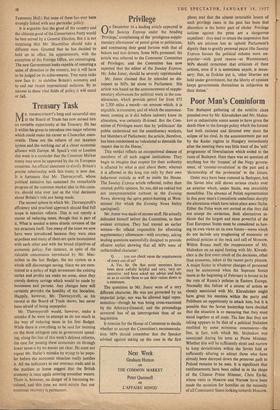LEFT RIGHT
THE contest between Mr. Macmillan and Mr. Butler for the Premiership has been viewed in several different lights—as a struggle between right and left in the Con- servative Party, between backward-looking reactionaries and forward-looking younger men, and between Sir Anthony Eden's Middle 'Eastern policy and some other unspecified attitude to foreign affairs. The choice of Mr. MacMillan, too, has been seen as a victory for the Right, the Left, the Suez group and the Cecil lobby. In fact, of course, all these inter- pretations are wrong. The words 'right' and 'left' are mis- leading as applied to the Conservative Party—as indeed they are to the Labour Party. But while it may be argued that it is the left of the Labour Party which is right—since it clings to the simple orthodoxy of fifty years ago—and the right which is left—since its attitude to the faith is considerably less conservative—these terms do indicate different bodies of people. This is not true of the Conservative Party. Many of the most Imperialist members of the party are also the most radical. Sir Ian Horobin and Mr. Julian Amery are both members of the Suez group, but it would be hard to find a home issue upon which they would agree. A party which in theory if not always in practice bases itself on empiricism rather than on theory or dogma is bound to divide in different directions on different issues rather than in set and consistent groups.
If he had not frequently been so described in the past few days one would have thought it impossible to designate Mr. Macmillan as a right-wing figure. In the Thirties he was an anti-appeaser and a Keynesian, and since the war his interest in the United Europe movement at Strasbourg and as Chancellor of the Exchequer in the Common Market hardly mark him out as a reactionary. Admittedly he is said to have been one of the more bellicose members of the Government over Suez, at least until a late stage, while Mr. Butler is said to have counselled moderation at most stages and to have urged the necessity of a cease-fire. But all the talk about those in the Cabinet who were gunboat-minded and those who were not, those who wanted to call the adventure off and those who wanted to carry it through, is more than a little unreal. Over any great issue there are bound to be gradations of opinion, and Port Said was no exception. The essential fact is that none of the Cabinet resigned. Whether or not some of them disapproved of the expeditio'n and almost resigned is irrelevant. Two or three of the Cabinet nearly resigned with Mr. Duff Cooper over Munich; but they did not do so, and they soon became as identified with Mr. Chamberlain's policy as those who thought it a Master stroke of diplomacy. The same is now true of the Suez Cabinet.
The struggle between Mr. Macmillan and Mr. Butler was not one of Policy or of different wings of the party. It was a personal contest. Mr. Butler lost because over the last few months he has to a great extent forfeited the respect of his colleagues in the Cabinet and the back-benchers in the House. Rightly or wrongly he has been thought to have been all things to all men, to have tried to please everyone; and this did considerable damage to his reputation for sincerity and high-mindedness. It may be that this view of him is unfair, that the intra-party diplomacy of Mr. Macmillan has been no less oriental. But if that is the case, then Mr. Macmillan has been much more skilled in these arts than his rival. His reputation for sincerity stands wherever it did before.
The suggestion that Mr. Macmillan has named a right-wing Cabinet is as groundless as the idea that his own appointment represents a victory for the right. If this is a right-wing Cabinet, who, one wonders, would have been the members of a left-wing Cabinet? Mr. Thorneycroft, who has gained the most spectacular promotion, made an enthusiastic Suez speech in Parliament which did not satisfy the most elemen- tary requirements of factual accuracy; but his excellent and liberal record at the Board of Trade as well as his pronounce- ments in Opposition disqualify him from the status of right- winger. Lord Hailsham is another who has been unsparing in his praise of the Suez venture; but away from the stimulating sea breezes of the Admiralty and in the deeper and stiller waters of Education he will play a more charac- teristic role.
The great surprise is, of course, the retention of Mr. Selwyn Lloyd at the Foreign Office. This may be intended as an outward and visible sign that while Mr. Macmillan may feel that the execution of the Suez venture was defective, its conception was right and good. It is difficult to see who, out- side the Cabinet, would be impressed by such a gesture. Or Mr. Macmillan may think that Mr. Selwyn Lloyd has not yet had a proper chance to show what he can do. It is more probable that Mr. Lloyd is scheduled to carry out that by now fashionable manceuvre—a phased withdrawal. Mr. Lloyd has the trust of the Suez group, but as this feeling about him is less strong among our allies, and as, long before Suez, it was doubtful if the Foreign Office was the ideal place for him, the case for displacing him in favour of either Lord Salisbury or Mr. Butler was overwhelming.
Plainly the departure of Mr. Head from the Ministry of Defence was necessary, if ministerial responsibility was to retain any meaning whatever. Most of the other four Ministers who leave the Cabinet, Sir Walter Monckton, Mr. Stuart, Mr. Buchan-Hepburn and Major Lloyd George, have done dis- tinguished service in one form or another. (Both Mr. Stuart and Mr. Buchan-Hepburn were Chief Whips in the days when the Whips' office at Westminster was still some distance from
Tammany Hall.) But none of these has ever been strongly linked with any particular policy.
It is arguable that the good of the country and the ultimate good of the Conservative Party would be best se,rved by a General Election. But it is not surprising that Mr. Macmillan should take a different view. Granted that he has decided to hold on to office. his appointments, with the exception of the Foreign Office, are encouraging. The new Government looks capable of restoring a sense of direction to the country, but it will have to be judged on its achievements. Two main tasks now face it: to stabilise Britain's economy and to end our recent international isolation. By its success in these vital fields of policy it will stand or falL



































 Previous page
Previous page